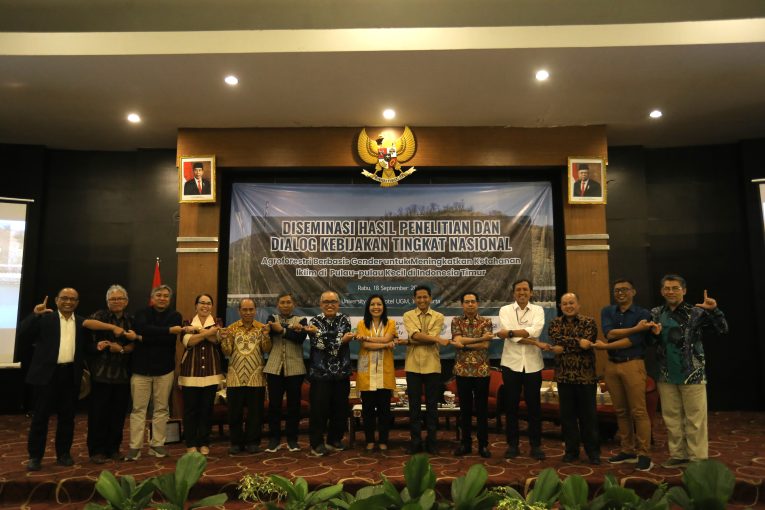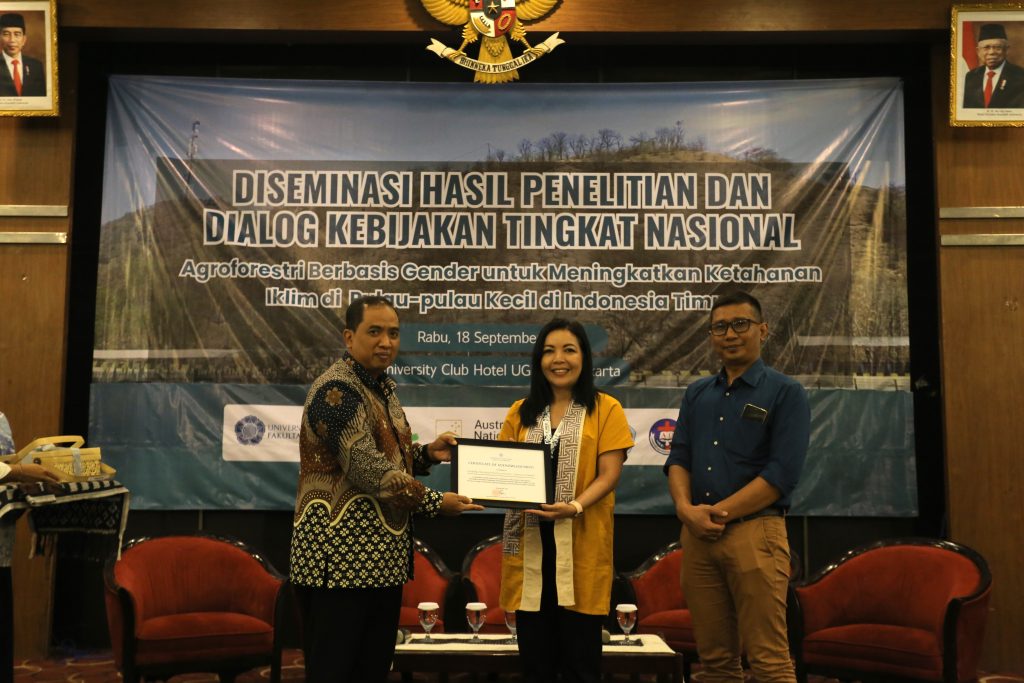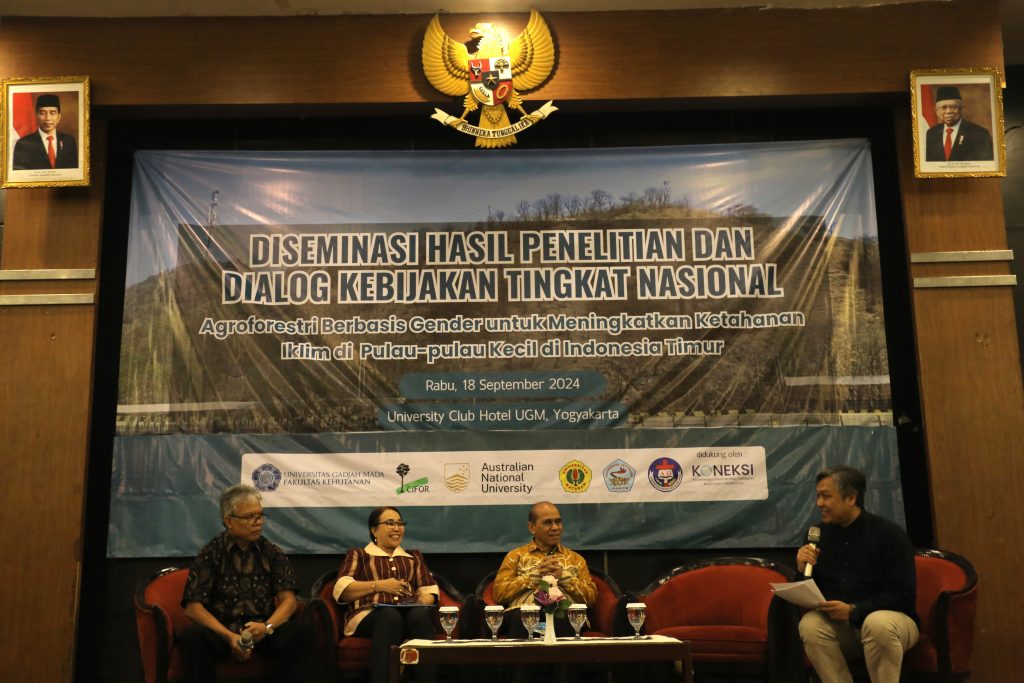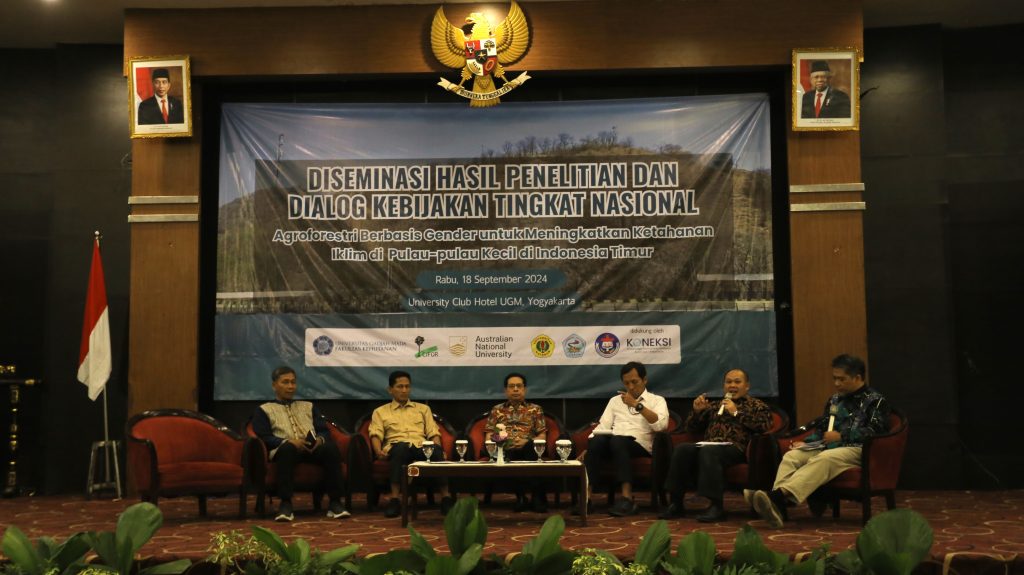
The Faculty of Forestry, Universitas Gadjah Mada (UGM), in collaboration with several national and international partners, successfully hosted the Research Dissemination and National Policy Dialogue. This event marked the conclusion of the research series titled “The Ridge to the Reef of Integrated Watershed Management Approach (IWMA) to Foster the Socio-Ecology Climate and Livelihoods Resilience of Small Islands in Eastern Indonesia.” The event was held in a hybrid format, both online via Zoom Meeting and offline at the University Club Hotel UGM, 18 September 2024, starting at 9:00 AM.
This research was a joint collaboration between the Faculty of Forestry UGM, CIFOR (Center for International Forestry Research), Universitas Mataram (UNRAM), Universitas Kristen Artha Wacana (UKAW), Universitas Pattimura (UNPATTI), and the Australian National University (ANU). The project was funded by the Knowledge Partnership Platform Indonesia-Australia.
The event opened with welcoming remarks from the Dean of the Faculty of Forestry UGM, Ir. Sigit Sunarta, S.Hut., M.P., M.Sc., Ph.D., IPU. This was followed by an introduction to the KONEKSI research program by the head of the research team, Prof. Dr. Ahmad Maryudi. His introduction concluded with a video presentation providing an overview of the research journey from beginning to end.
The first session featured research presentations by representatives from UNRAM, UKAW, UNPATTI, and CIFOR. Prof. Dr. Muktasam, M. Agr.Sc., Ph.D. (UNRAM), Dra. Lintje H. Pellu, M.Si., Ph.D. (UKAW), and Prof. Dr. Ir. Agustinus Kastanya, M.S. (UNPATTI) presented their findings from each province, while Penza Lindiani, S.Hut., M.Si. (CIFOR) discussed Climate Smart Agroforestry (CSAF). This session, moderated by Dr. Ir. Hero Marhaento, S.Hut., M.Si., IPU, highlighted the impacts of climate change on local communities and how agroforestry has emerged as a strategy for both meeting household needs and adapting to climate change. The presentations underscored the importance of expanding gender-inclusive agroforestry practices, attracting youth to land management, selecting appropriate commodities, and addressing challenges such as legal access, funding, capacity building, and market access.
The second session was the National Policy Dialogue moderated by Ir. Dwiko Budi Permadi, S.Hut., M.Sc., Ph.D., IPU. Key government representatives and policy experts discussed the role of agroforestry in national land-based development and integrated watershed management.
Dr. Nur Sumedi, S.Pi., M.P., Secretary of the Environmental Standardization Agency, Ministry of Environment and Forestry (KLHK), emphasized the need for agroforestry standards informed by scientific evidence to assist farmers in selecting appropriate species for their practices. Ir. Sri Handayaningsih, M.Sc., Secretary of the Director General of Watershed Management and Forest Rehabilitation (PDAS-RH), KLHK, added that agroforestry is well-suited to land-based national development, particularly in the context of watersheds, where the selection of baseline data is critical. She also discussed the importance of addressing gender in its broadest sense, incorporating socio-cultural aspects and ensuring that support reaches all levels of society.
Danang Kuncara Sakti, S.Hut., M.E., Head of the Social Forestry and Environmental Partnership Office for the Java Region, expanded on the gender dimension in agroforestry within the Ministry of Environment and Forestry, noting the significant yet often underreported role of women in land management. Despite the prominence of women-led farming groups, data collection typically focuses on household heads, who are often men, overlooking the contributions of women in practice.
Further contributions came from Dadang Jainal Mutaqin, S.Hut, M.EMD, Ph.D, Senior Planner at the Forestry and Water Resources Conservation Directorate (Bappenas), who emphasized that this research brings together various pieces of the policy puzzle and is a crucial step toward strengthening national policy through evidence-based approaches.
Dr. Anton A. Lailossa, ST., M.Si., Head of the Regional Development Planning Agency for Maluku, highlighted that issues such as gender and agroforestry are often treated separately at the community level, stressing the need for better integration of these issues into local planning documents and national-level discussions. Representatives from the provincial forestry and environment offices of Nusa Tenggara Barat (NTB) and Nusa Tenggara Timur (NTT), Julmansyah, S.Hut., MAP. and Rudi Lismono, S.Hut., shared insights on the unique challenges and opportunities faced by small island communities in their respective regions. They discussed the fiscal constraints encountered in implementing sustainable land-use practices. Julmansyah pointed out the disconnect between fiscal policies and local realities, where funding often fails to align with the actual needs of small islands, which are frequently overlooked in national development programs. Rudi Lismono elaborated on the challenges of seed supply, noting that the types of seedlings provided by government programs do not always match the needs of local communities. He called for integrated planning and coordination across government levels to ensure that small islands receive adequate attention in national policy frameworks, particularly regarding agroforestry, which has the potential to significantly improve climate resilience and livelihoods in these regions. Concluding the event, Muhammad Haidar Daulay, M.Sc delivered the conclusion of today’s fruitful discussion.



